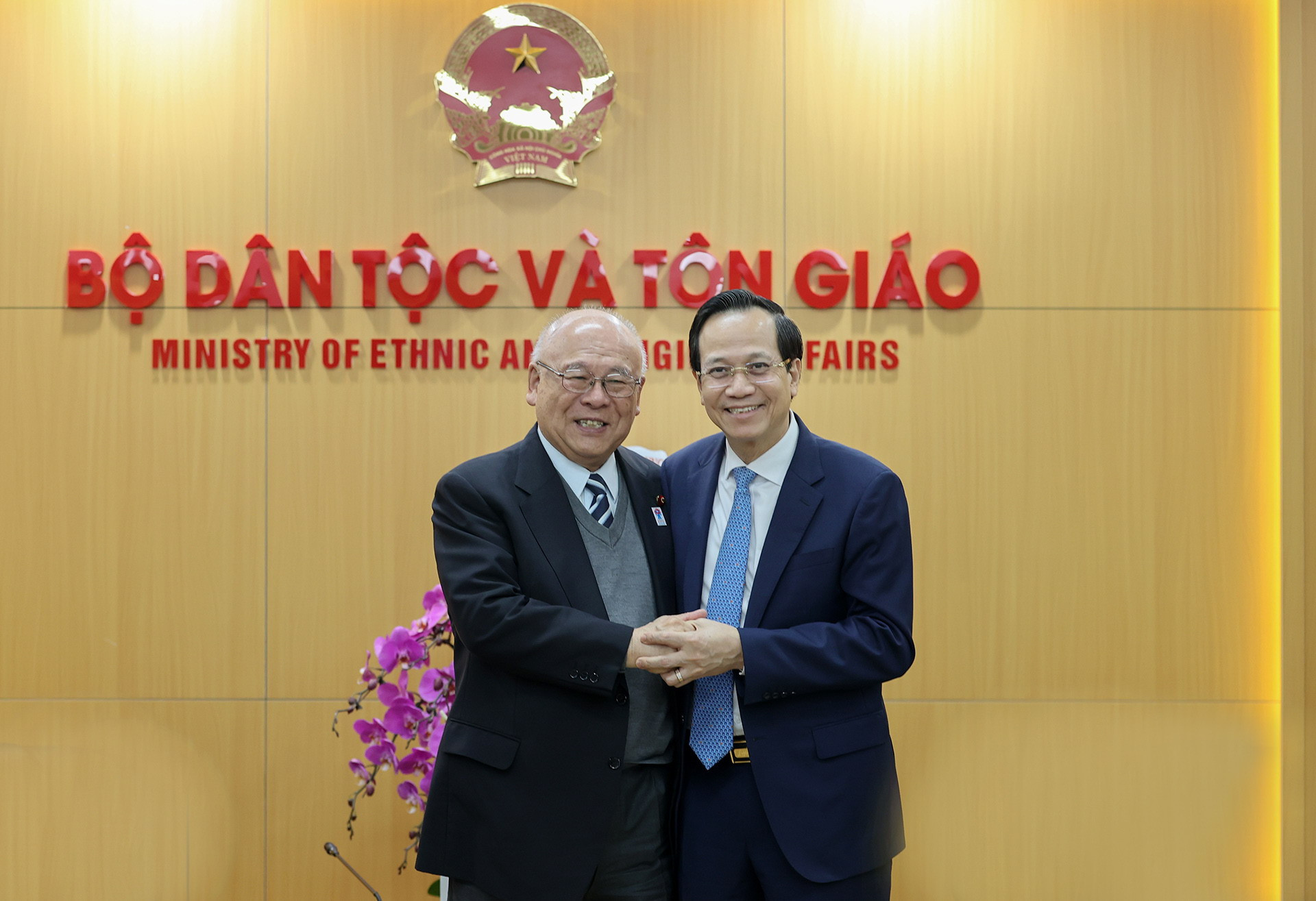Minister of Ethnic and Religious Affairs Dao Ngoc Dung on March 12 met with Takebe Tsutomu, Special Advisor to the Japan-Vietnam Friendship Parliamentary Alliance, along with a Japanese delegation visiting the ministry.
Takebe Tsutomu was the first international guest received by Minister Dao Ngoc Dung in his new position.

Congratulating Minister Dao Ngoc Dung on his new role, Takebe Tsutomu praised his dedicated efforts in leading the Ministry of Labor, War Invalids, and Social Affairs.
He acknowledged that Minister Dao Ngoc Dung had personally visited Japan multiple times, witnessing firsthand the working conditions of Vietnamese laborers, including interns, students, and high-skilled workers.
The minister had consistently advocated for better wages and improved conditions for Vietnamese workers in Japan, following Vietnam’s commitment to enhancing workforce quality.
Takebe Tsutomu likened the minister’s efforts to a flower blooming wherever he goes, as his proposals had led to significant policy changes in Japan regarding the education and employment of Vietnamese workers, replacing outdated mechanisms.
He commended Minister Dao Ngoc Dung for playing a pivotal role in strengthening Vietnam-Japan labor relations and resolving challenges that had paved the way for further cooperation.
Thanks to these efforts, Vietnamese workers in Japan have progressed from basic manual labor to specialized and high-skilled professions.
Many have transitioned from being employees to business owners, embodying the phrase, “Go abroad as a worker, return as an entrepreneur.”
Minister Dao Ngoc Dung expressed his appreciation for Takebe Tsutomu’s contributions to bilateral cooperation between Vietnam’s Ministry of Labor, War Invalids, and Social Affairs and Japan’s Ministry of Health, Labor, and Welfare, as well as other related organizations.
He emphasized the importance of fostering Vietnam-Japan relations based on mutual trust and understanding, quoting the late Japanese Prime Minister Fukuda Takeo: “From heart to heart.”
Expanding japan’s development support to Vietnam’s remote areas

In a warm and open discussion, Minister Dao Ngoc Dung highlighted Vietnam’s ethnic and religious diversity, with ethnic minorities accounting for 14% of the population and 27 million people following various faiths.
While Vietnam’s mountainous and remote regions hold significant development potential, they also face some of the country’s greatest challenges.
Vietnam’s path to accelerated progress requires addressing disparities in ethnic minority and remote communities to ensure no one is left behind.
The government is currently implementing three national target programs focused on rural development: building new rural areas, sustainable poverty reduction, and socio-economic development for ethnic minorities and mountainous regions.
Minister Dao Ngoc Dung proposed increased collaboration between Japan and Vietnam’s remote and mountainous regions through international organizations.
He specifically suggested launching additional programs similar to IM Japan, a technical training initiative for Vietnamese interns in Japan established in 2006.
By expanding such programs, more young people from underprivileged areas could have opportunities to work in Japan, improving their incomes while gaining valuable experience and shifting their mindset towards economic empowerment.
The minister also requested Takebe Tsutomu’s support in securing an official development assistance (ODA) program dedicated to Vietnam’s remote regions, particularly the Northwest, Central Highlands, and Mekong Delta provinces.
He outlined Vietnam’s plan to expand boarding schools in these areas, integrating vocational training in partnership with Japanese businesses and labor unions. This initiative would prepare students not only for academic success but also for future employment abroad.
He invited Japanese enterprises to visit Vietnam’s mountainous regions to gain a deeper understanding of local challenges and explore potential areas of cooperation.
Japan’s support for workforce development in Vietnam

Endorsing Minister Dao Ngoc Dung’s proposals, Takebe Tsutomu suggested a model where students from Vietnam’s remote areas could both work and study in Japan.
He proposed an initiative where Vietnamese workers in Japan could obtain educational certifications through mobile applications, later linking their qualifications to the Vietnam-Japan University.
The Vietnam-Japan University project has been approved by the university council and is awaiting a pre-feasibility study review by the Vietnamese government.
The institution aims to be one of Asia’s leading research-oriented universities while also providing high-quality practical training for immediate workforce deployment.
This university is expected to be a key player in developing human resources for Vietnam’s remote areas, addressing concerns raised by Minister Dao Ngoc Dung.
Students from ethnic minority backgrounds could reside in campus dormitories and receive accredited vocational training, preparing them for employment in Japanese enterprises.
This initiative could significantly contribute to poverty reduction in Vietnam’s remote regions.
Takebe Tsutomu recommended that the Vietnamese government submit an official request to Japan regarding the establishment of an ODA project focused on capacity building in ethnic minority and remote areas.
He also announced upcoming initiatives by the Japanese government to enhance Vietnam’s workforce quality.
Japan currently sees an annual return of 30,000 to 50,000 Vietnamese workers from previous internship and employment programs.
Among them, highly skilled individuals, particularly those proficient in Japanese at N4 level or higher, will be selected for retraining programs under the Japanese government’s initiative.
Additionally, pilot programs in information technology training, in collaboration with Vietnamese firm Rikkei Soft, are scheduled to launch in June or July with an initial cohort of 25 students.
Other projects include the retraining of former interns and additional workforce development programs.
Japan’s continued support will play a crucial role in bridging the gap between urban and rural areas in Vietnam, ensuring that no community is left behind as the country advances into a new era of development.
Binh Minh